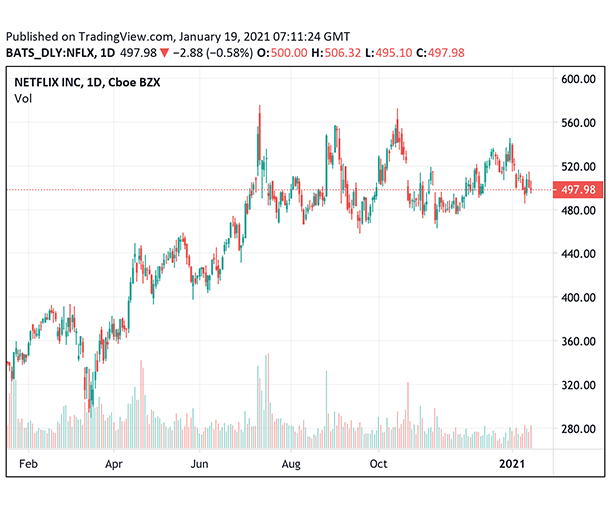
Tuesday, January 19, 2021
Netflix Shares: Should Investors Invest Ahead of Earnings
By Century Financial in 'Brainy Bull'


Last year was something of a bumpy road for Netflix’s [NFLX] share price. Although Netflix’s share price made some decent gains in 2020, its overall growth was stunted by pullbacks. On 16 March, Netflix’s share price fell as low as $294.75 before closing at $298.84 — marking its worst day of trading last year.
However, it didn’t take Netflix’s share price long to recover and on its best-ever day on the market, 1 September 2020, Netflix’s share price closed at $556.55, which was up 72% on the year.
For most of 2020, Netflix’s share price performance outpaced that of the Nasdaq index, though more recently the gap between the two has been narrowing. This comes after a steady year of growth for the Nasdaq, while Netflix seems to have lost its momentum.
As of 15 January, Netflix’s share price of $497.98 is up 46.9% over the last 12 months, but down 7.9% so far in 2021.
Could the company’s upcoming earnings release, due 19 January, give Netflix’s share price a boost?


How has Netflix been performing?
When Netflix released its third-quarter results on 20 October it reported earnings of $1.74 per share, which missed the consensus estimate from Zacks Equity Research of $2.12 by 21.8%. Although Netflix also missed its own guidance — which predicted earnings of $2.09 — the figures still marked an increase of 18.4% year over year.
On the other hand, revenues grew 22.7% year over year to reach $6.44bn, beating analysts’ expectations by 0.94%. It’s also worth noting that Netflix added 2.2 million paid subscribers in Q3, meaning that the company missed its own target of adding 2.5 million paid subscribers — this also marked a 67.6% year over year decline in growth.
To put this into perspective, Netflix had 195.15 million paid subscribers around the world by the end of Q3. While that was an increase of 23.3%, it wasn’t quite the 195.45 million subscribers that management was after.


The markets did not react kindly to this news, and the day after the results were released, Netflix’s share price closed 6.9% lower than the previous session.
Looking ahead to the upcoming results, analysts expect Netflix to post earnings of $1.38 per share, which would represent a growth of 6.2% year over year. Revenues, on the other hand, are expected to grow 20.8% from last year to $6.60bn.
For the full fiscal year, Wall Street expects Netflix’s earnings per share to total $6.27 and for revenues to reach $24.96bn.
Does Netflix’s share price present an opportunity?
“Netflix is still aiming for high-octane growth in the long run,” Anders Bylund wrote in The Motley Fool. “The company is adding subscribers at breakneck speed while also raising its monthly subscription fees. The media-streaming market is still young, and Netflix is in a prime position to grab the lion's share of this centennial business opportunity.”


In a research note seen by The Fly, Justin Patterson, analyst at KeyBanc, is reported to have said that Netflix's 2021 film slate "marks a more pronounced shift toward quality”.
Apparently, the analyst believes the sheer scale of Netflix has made direct-to-streaming a more compelling method of distribution for actors and directors, especially as the coronavirus pandemic takes its toll on box-office revenues. Patterson predicted that, if Netflix can succeed in film, its lifetime subscriber value could increase due to improved retention and pricing power.
In light of this, Patterson has maintained an overweight rating on the stock, with a $634 price target. However, the wider consensus is even more bullish, as 42 analysts polled by CNN Money rate Netflix a buy. This rating is held by a majority of 21 analysts, with 12 suggesting to hold the stock, five giving it an outperform rating, one rating it underperform and three suggesting to sell.
Meanwhile, the median 12-month price target among 38 analysts polled by CNN Money is $585.80, with a high estimate of $700 and a low of $235. The median price represents a 16.6% increase from Netflix’s share price as of close on 15 January.
“Netflix is shooting for maximum subscriber and revenue growth at this point. I can't wait to see where the $223bn market cap is going when the company decides it's time to optimize the bottom line instead,” Bylund concluded. Meanwhile, in a subsequent article for The Motley Fool, Bylund said Netflix was one of a handful of stocks that he will “never sell”, stating his personal belief that it is “a buy at pretty much any price”.


Source: This content has been produced by Opto trading intelligence for Century Financial and was originally published on cmcmarkets.com/en-gb/opto
Disclaimer: Past performance is not a reliable indicator of future results.
The material (whether or not it states any opinions) is for general information purposes only and does not take into account your personal circumstances or objectives. Nothing in this material is (or should be considered to be) financial, investment or other advice on which reliance should be placed. No opinion given in the material constitutes a recommendation by Century Financial or the author that any particular investment, security, transaction or investment strategy is suitable for any specific person.
Century Financial does not endorse or offer opinion on the trading strategies used by the author. Their trading strategies do not guarantee any return and Century Financial shall not be held responsible for any loss that you may incur, either directly or indirectly, arising from any investment based on any information contained herein.












